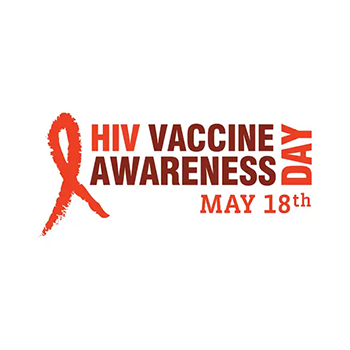HIV Vaccine Awareness Day
HIV Vaccine Awareness Day (HVAD) recognizes the many volunteers, community members, health professionals, and scientists working together to develop a vaccine to prevent HIV. It is also an opportunity to educate communities about the importance of preventive HIV vaccine research. Held annually on May 18, the observance commemorates U.S. President Bill Clinton’s 1997 declaration that “only a truly effective, preventive HIV vaccine can limit and eventually eliminate the threat of AIDS.”
The National Institutes of Health (NIH) HIV research program, coordinated by the NIH Office of AIDS Research (OAR), supports research to develop an effective HIV vaccine, as well as research on strategies to encourage people to receive an HIV vaccine when it is available. Researchers are making promising headway in efforts to develop a safe, effective HIV vaccine. These include vaccine candidates that:
- Uses broadly neutralizing antibodies (bNAbs), a type of antibody that can recognize HIV and block the virus from entering immune cells.
- Help generate an HIV-specific immune response through T cells, a type of white blood cell, that can recognize HIV and help prevent chronic infections.
- Leverage messenger RNA (mRNA) platforms to help the immune system recognize, remember, and respond to the virus.
Insights from HIV vaccine research help spur groundbreaking advances in other areas of science and health care. Most recently, these insights provided a foundation for rapid development of COVID-19 vaccines.
Social Media
Use the hashtag #HVAD to follow the conversation on social media. Download graphics and find sample social media posts to promote safe and effective vaccine to prevent HIV on the HIV.gov HVAD webpage and the Centers for Disease Control and Prevention (CDC) HVAD webpage.

Additional Resources
NIH Office of AIDS Research (OAR)
- FY 2021–2025 NIH Strategic Plan for HIV and HIV-Related Research (NIH HIV Strategic Plan). The NIH HIV Strategic Plan provides a roadmap for the National Institutes of Health (NIH) to guide HIV-related research and direct HIV research funding to the highest-priority areas to help end HIV. NIH supports research to develop an effective vaccine, as well as research on strategies to encourage people to receive an HIV vaccine when it is available.
- NIH Statement on HIV Vaccine Awareness Day 2023: This NIH statement, jointly issued by OAR and the NIH National Institute of Allergy and Infectious Diseases (NIAID), recognizes the collaborative global community of scientists, advocates, study participants, study staff, and funders enabling unprecedented levels of innovation and adaptation in the pursuit of a highly effective HIV vaccine. The statement summarizes current NIH-supported HIV vaccine research and reaffirms NIH’s commitment to the development of an effective, acceptable, safe, and long-lasting HIV vaccine.
- This OAR webpage describes how NIH-funded research is helping to reduce the incidence of HIV through clinical trials to test effectiveness of potential HIV vaccines, as well as through research to advance other nonvaccine prevention methods.
- This OAR’s Directors Blog post describes the importance of advancing HIV vaccine research and recognizes scientists, health professionals, volunteers, and community members who are working to find an effective vaccine to prevent HIV.
- HIVinfo.NIH.gov, maintained by OAR, provides HIV-related infographics, fact sheets, and links to HIV-related resources from federal and nonfederal sources. Check out the following resources on HIV vaccines:
- What is a Preventive HIV Vaccine? (Fact sheet)
- What is a Therapeutic HIV Vaccine? (Fact sheet)
NIH National Institute of Allergy and Infectious Diseases (NIAID)
- NIAID supports scientists who are conducting research to create a safe, effective HIV vaccine. Learn about approaches to HIV vaccine research and the history of HIV vaccine research. This infographic summarizes progress toward an HIV vaccine over time. Also, find answers to frequently asked questions about vaccine research, including questions on preventive HIV vaccine development.
HIV Vaccine Trials Network (HVTN)
- The HIV Vaccine Trials Network (HVTN) is the world’s largest publicly funded multidisciplinary international collaboration facilitating the development of vaccines to prevent HIV. HVTN conducts all phases of clinical trials, from evaluating experimental vaccines for safety and immunogenicity to testing vaccine efficacy. HVTN receives support through a collaborative agreement with the NIAID Division of AIDS (DAIDS).
Clinical Trials About HIV Vaccines
- Find clinical trials related to HIV and AIDS vaccine research at ClinicalTrials.gov. Read the HIVinfo HIV and AIDS Clinical Trials fact sheet to learn more about clinical trials. Call HIVinfo at 1-800-448-0440 for assistance with your clinical trials search.
HIV.gov
- HIV.gov provides information on the U.S. government’s HIV response, including relevant federal HIV policies, programs, and resources and to increase knowledge about HIV and access to HIV services to people with HIV or at risk of HIV acquisition. Learn more about HIV vaccines and find additional information about HIV Vaccine Awareness Day.